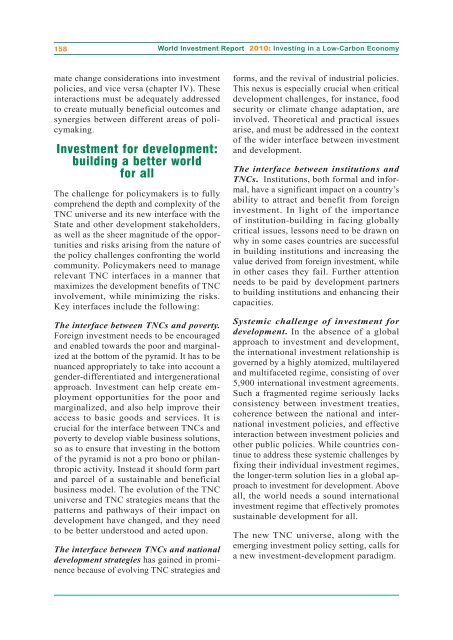UN World Investment Report 2010 - Office of Trade Negotiations
UN World Investment Report 2010 - Office of Trade Negotiations
UN World Investment Report 2010 - Office of Trade Negotiations
Create successful ePaper yourself
Turn your PDF publications into a flip-book with our unique Google optimized e-Paper software.
158<br />
mate change considerations into investment<br />
policies, and vice versa (chapter IV). These<br />
interactions must be adequately addressed<br />
to create mutually beneficial outcomes and<br />
synergies between different areas <strong>of</strong> policymaking.<br />
<strong>Investment</strong> for development:<br />
building a better world<br />
for all<br />
The challenge for policymakers is to fully<br />
comprehend the depth and complexity <strong>of</strong> the<br />
TNC universe and its new interface with the<br />
State and other development stakeholders,<br />
as well as the sheer magnitude <strong>of</strong> the opportunities<br />
and risks arising from the nature <strong>of</strong><br />
the policy challenges confronting the world<br />
community. Policymakers need to manage<br />
relevant TNC interfaces in a manner that<br />
maximizes the development benefits <strong>of</strong> TNC<br />
involvement, while minimizing the risks.<br />
Key interfaces include the following:<br />
The interface between TNCs and poverty.<br />
Foreign investment needs to be encouraged<br />
and enabled towards the poor and marginalized<br />
at the bottom <strong>of</strong> the pyramid. It has to be<br />
nuanced appropriately to take into account a<br />
gender-differentiated and intergenerational<br />
approach. <strong>Investment</strong> can help create employment<br />
opportunities for the poor and<br />
marginalized, and also help improve their<br />
access to basic goods and services. It is<br />
crucial for the interface between TNCs and<br />
poverty to develop viable business solutions,<br />
so as to ensure that investing in the bottom<br />
<strong>of</strong> the pyramid is not a pro bono or philanthropic<br />
activity. Instead it should form part<br />
and parcel <strong>of</strong> a sustainable and beneficial<br />
business model. The evolution <strong>of</strong> the TNC<br />
universe and TNC strategies means that the<br />
patterns and pathways <strong>of</strong> their impact on<br />
development have changed, and they need<br />
to be better understood and acted upon.<br />
The interface between TNCs and national<br />
development strategies has gained in prominence<br />
because <strong>of</strong> evolving TNC strategies and<br />
<strong>World</strong> <strong>Investment</strong> <strong>Report</strong> <strong>2010</strong>: Investing in a Low-Carbon Economy<br />
forms, and the revival <strong>of</strong> industrial policies.<br />
This nexus is especially crucial when critical<br />
development challenges, for instance, food<br />
security or climate change adaptation, are<br />
involved. Theoretical and practical issues<br />
arise, and must be addressed in the context<br />
<strong>of</strong> the wider interface between investment<br />
and development.<br />
The interface between institutions and<br />
TNCs. Institutions, both formal and informal,<br />
have a significant impact on a country’s<br />
ability to attract and benefit from foreign<br />
investment. In light <strong>of</strong> the importance<br />
<strong>of</strong> institution-building in facing globally<br />
critical issues, lessons need to be drawn on<br />
why in some cases countries are successful<br />
in building institutions and increasing the<br />
value derived from foreign investment, while<br />
in other cases they fail. Further attention<br />
needs to be paid by development partners<br />
to building institutions and enhancing their<br />
capacities.<br />
Systemic challenge <strong>of</strong> investment for<br />
development. In the absence <strong>of</strong> a global<br />
approach to investment and development,<br />
the international investment relationship is<br />
governed by a highly atomized, multilayered<br />
and multifaceted regime, consisting <strong>of</strong> over<br />
5,900 international investment agreements.<br />
Such a fragmented regime seriously lacks<br />
consistency between investment treaties,<br />
coherence between the national and international<br />
investment policies, and effective<br />
interaction between investment policies and<br />
other public policies. While countries continue<br />
to address these systemic challenges by<br />
fixing their individual investment regimes,<br />
the longer-term solution lies in a global approach<br />
to investment for development. Above<br />
all, the world needs a sound international<br />
investment regime that effectively promotes<br />
sustainable development for all.<br />
The new TNC universe, along with the<br />
emerging investment policy setting, calls for<br />
a new investment-development paradigm.

















